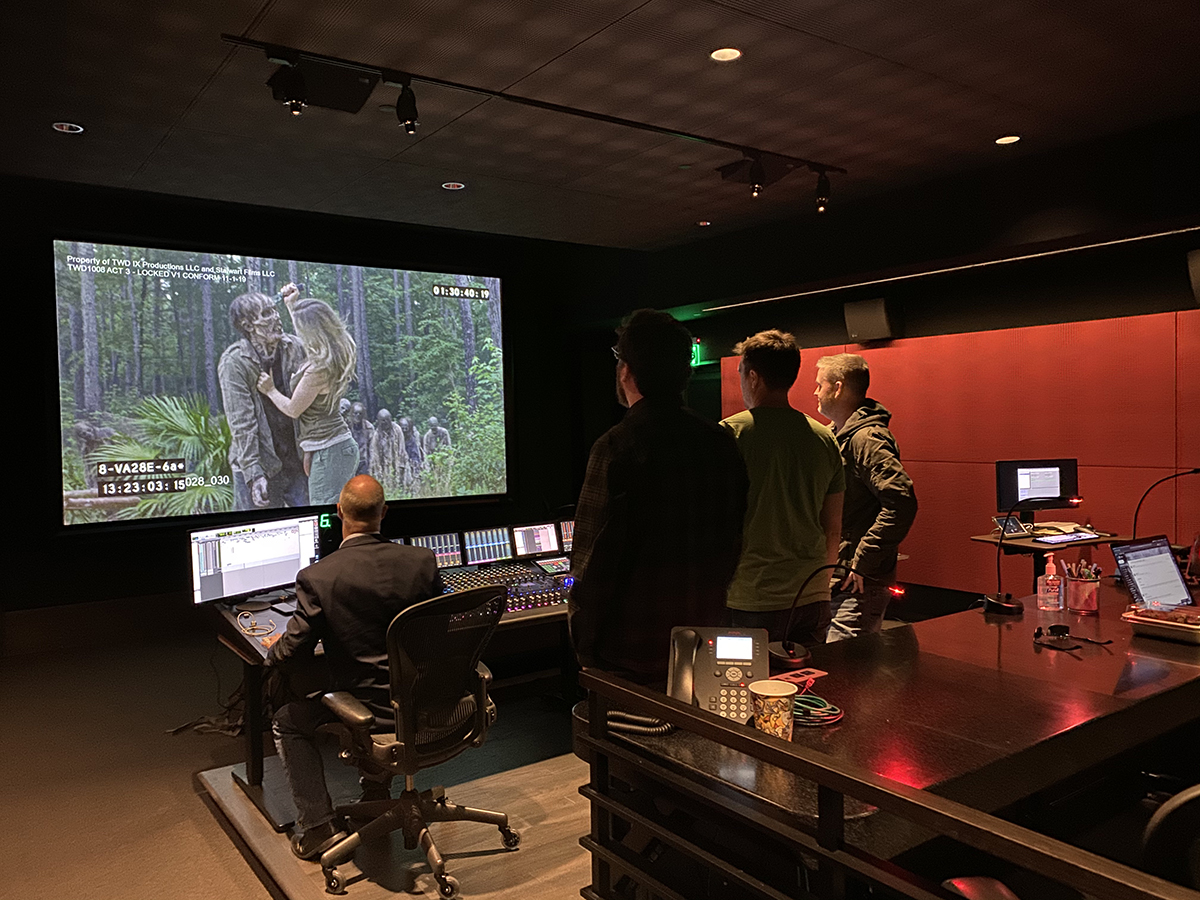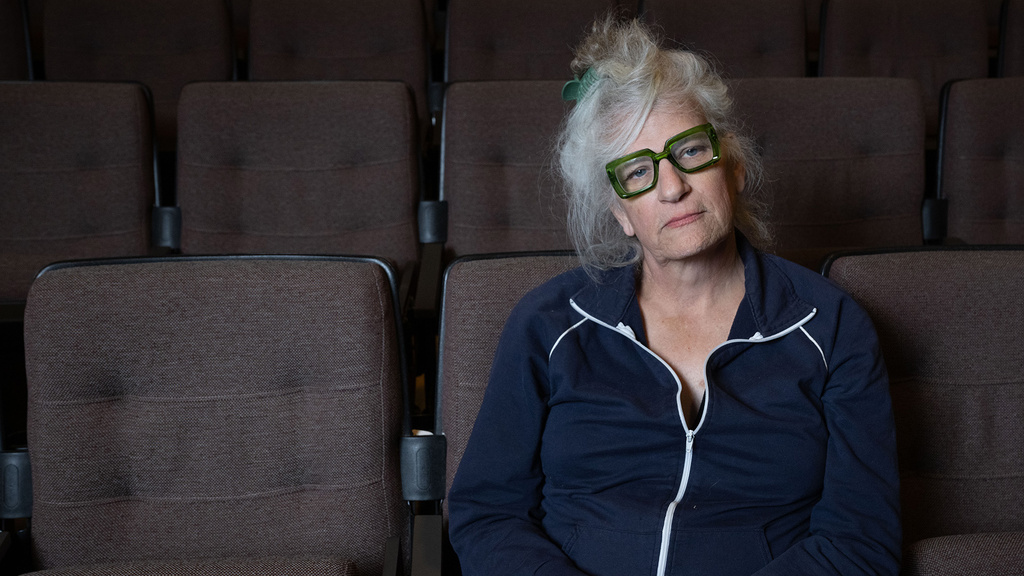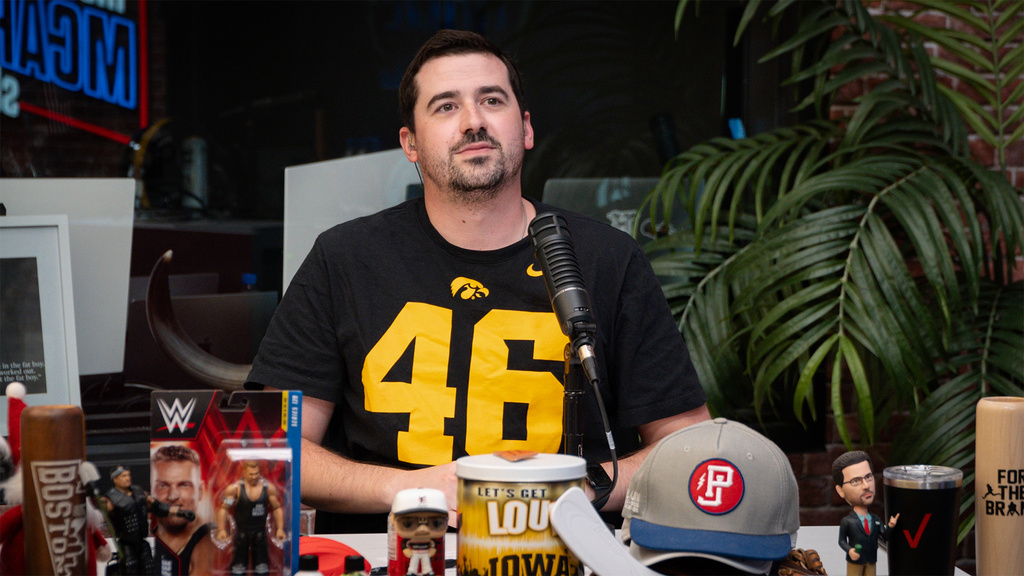As a producer on AMC’s popular zombie drama, University of Iowa graduate Ryan DeGard oversees the postproduction process, preparing each episode for prime time.
Story: Sara Epstein Moninger
Photography: Courtesy of Ryan DeGard
Published: Sept. 28, 2020
The waiting is the hardest part.
So sings Tom Petty—and millions of fans of the hit TV series The Walking Dead from week to week. Especially last spring, when the show about a zombie apocalypse took an unplanned hiatus before the season finale was to air on AMC. Although the episode had been shot, final work had not yet been completed when the coronavirus pandemic shut down production, and loyal viewers were left hanging.
Nobody understands the effort that goes into preparing an episode for air—like perfecting blood spray and capturing undead growls and grunts—better than University of Iowa alumnus Ryan DeGard, who is in charge of the show’s postproduction.
“A lot of work happens after the shoot,” says DeGard, who earned a BA in communication studies from Iowa in 2000. “First, the editors get started cutting the footage together, working with the director’s cut, and then the producers turn in cuts to the studio and the network. Once we ‘lock’ the content of an episode, we begin work on the sound design, the music, and the visual effects. The process can often take months for a show of this size.”
Though the pandemic slowed down production, DeGard and his colleagues were able to finish the episode remotely, and it airs Oct. 4. An additional six episodes will extend the season through early 2021.
“I was considering the big film schools in New York and Los Angeles, but I was daunted by the price. When I realized that the University of Iowa had a good film program that was affordable, I thought, ‘Oh, I can go right here!’”

As the person in charge of postproduction on The Walking Dead, University of Iowa graduate Ryan DeGard (far right) spends a lot of time on the Warner Bros. lot in the show’s dedicated mix studio, where final footage, visual effects, and sound are put together.
DeGard, who previously worked on Luke Cage, Pretty Little Liars, Third Watch, and One Tree Hill, among other projects, joined The Walking Dead in 2016. He says he loves the collaborative nature of postproduction work.
“On an average day—pre-pandemic—I could be doing anything from watching cuts with my editors and giving them my insight, to reviewing visual effects shots and giving notes to get things looking the way we want them, to reviewing the online and final color of an episode to make sure it is ready for air,” says DeGard, noting that the show is shot in Georgia while writing and postproduction teams are based in Los Angeles. “I also work with the cast on automated dialog replacement, known as ADR, and go to our mixing stage at Warner Bros. to review an episode’s sound after we put it all together.”
DeGard, who was born in Waterloo and attended high school in Bettendorf, has been working in television production since graduating from Iowa. Although interested in film from a young age, he didn’t see a career path for himself and briefly studied criminal justice at Western Illinois University instead. When he circled back to film, he was pleased to find a robust program in his home state.
“I was considering the big film schools in New York and Los Angeles, but I was daunted by the price,” he says. “When I realized that the University of Iowa had a good film program that was affordable, I thought, ‘Oh, I can go right here!’”
At Iowa, DeGard says he was introduced to every aspect of filmmaking—from screenwriting to camerawork to acting.
“Learning to shoot and edit and put the whole thing together was really important,” says DeGard, whose extracurricular experiences included an internship on the 1999 Fox Searchlight film Whiteboyz and part-time work as a camera operator for an area NBC affiliate. “Even my drama class was very influential because it showed me the ‘other side’ and helped me become comfortable in front of people and learn my characters.”
Becoming well-rounded in film served DeGard well when he moved to the West Coast after graduation. He spent nearly a year serving in various internships and networking before he started regularly getting work as a production assistant—a position he says was more demanding of his time and energy than expected. When an industry contact encouraged him to interview for a job in postproduction, he kept his mind open. And he encourages others to do the same.
“I always thought I was going to come to LA and write and direct, because that’s what I loved doing. I never really thought of working in this side of the industry, and I have found it to be really interesting and challenging in its own ways,” he says. “Life in this business doesn’t fit into just one box. You can find something you are passionate about and satisfies your love of the medium that you might not have known about when you first started down this road. There are so many ways to be a creative individual in film and television.”
Postproduction work is creative in ways he had not expected, DeGard says.
“I love that I can have a hand in the creative decisions on the back side of the process—helping to decide what a visual effects shot will be, for example,” says DeGard, who admits he was a fan of The Walking Dead before joining the production team toward the end of the show’s sixth season. “I also really enjoy working with my sound supervisor to come up with the right sounds for each episode and creating that soundscape for the show.”
The 11th and final season of The Walking Dead is scheduled to air in 2021 and 2022, but spinoffs will continue.
“It is kind of shocking that, after all this time, the show is still just as popular ever, and it continues to innovate and change itself,” DeGard says. “The continued success has prompted more and more spinoffs, one of which is set to debut this fall, and the things they have in the works are really interesting and continue to be a new outlet for entertainment.”
DeGard says his experience at Iowa shaped him as a person, and he encourages budding filmmakers to take advantage of various campus opportunities.
“Every class I took really opened my eyes to the world of film,” he says. “I entered bright-eyed, a fan of being transported to a different world in a movie theater, but I learned so much more about the deep meaning behind films and the innovative ways they were created. It really opened the door for me to be a success when I came to LA, which is such a different world.”
What this producer of “The Walking Dead” is watching
University of Iowa graduate Ryan DeGard, who oversees postproduction on AMC’s The Walking Dead, used to go to the movies every weekend as a student, a tradition he continued until the pandemic shut down movie theaters across the country.
Although he doesn’t watch as much television as he used to, he is thrilled with the advanced and longer-form storytelling he is seeing. His current favorites include:
- HBO’s I’ll Be Gone in the Dark, a documentary about the Golden State killer
- Disney’s The Mandalorian, a series that is part of the Star Wars franchise
- Netflix’s Ozark, a thriller starring Jason Bateman as a financial-planner-turned-money-launderer
- HBO’s Watchmen, a limited series based on the graphic novel
- Paramount Network’s Yellowstone, a Western starring Kevin Costner as a rancher protecting his land from encroachers
Did you know?
If you are interested in becoming a filmmaker, editor, camera assistant, screenwriter, producer, or casting agent, the University of Iowa offers degrees in cinema and in screenwriting arts. Students are instructed on the practical skills and knowledge needed in these industries and also learn about history and theory.



